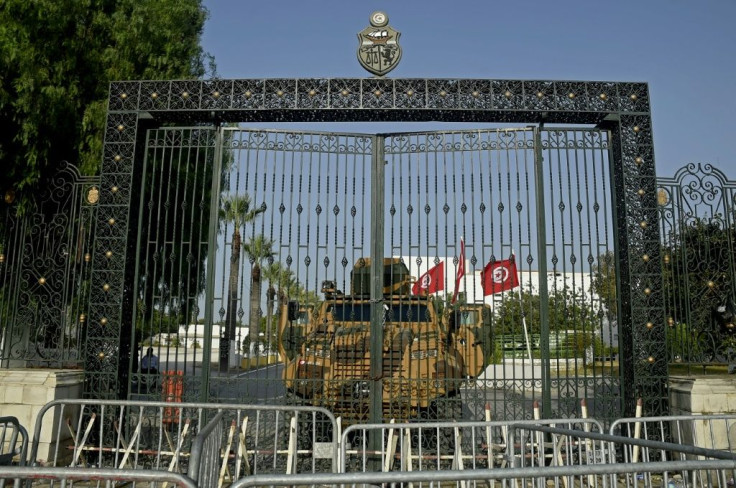Tunisian President Says Parliament Suspended Indefinitely
Tunisian President Kais Saied has extended his suspension of parliament "until further notice", a month after sacking his premier and granting himself greater powers in a shock intervention opponents decried as a coup.
"Parliament is a danger to the state," he said on Tuesday during a meeting with Trade Minister Mohamed Bousaid.
"The existing political institutions and how they operate represent a persistent danger to the state."
A statement from the presidency late on Monday extended an order freezing immunity for lawmakers and said Saied would address the people in the coming days, without elaborating.
The Islamist-inspired Ennahdha party, the main parliamentary force, expressed on Tuesday evening its "concern over the unconstitutional extension of the exceptional measures".

It reiterated its stance that Saied's actions were a "flagrant violation of the constitution".
Tunisia, hailed as a rare democratic success story in the Middle East and North Africa, has been mired in political crisis since Saied's intervention, which comes as the country struggles with dire economic woes and the Covid-19 pandemic.
On July 25, Saied invoked the constitution to extend his authority, dismissing prime minister Hichem Mechichi and freezing parliament in what activists called a "purge" that has seen opponents, judges and businessmen arrested or banned from travel.
Saied issued "a presidential decree extending the exceptional measures... regarding the suspension of Parliament and lifting of the parliamentary immunity of its MPs until further notice", the presidency statement said.

Last month's intervention, which Saied said was necessary to prevent the country from collapse, sparked uncertainty for the North African nation.
He has yet to appoint a new government or reveal a "roadmap" for his decisions despite repeated demands from political parties.
France on Tuesday expressed hope that Tunisia would as soon as possible "be able to respond to the economic, social and health challenges it faces" and said it was monitoring the situation closely.
While the president enjoys widespread popularity at home, his move sparked fears internationally that the cradle of the 2011 Arab Spring is regressing towards authoritarianism.
Analysts expect Saied will announce new measures to reassure Tunisians and the international community.
Political scientist Slaheddine Jourchi told AFP the decision had been expected.

He said Saied wants to show "that he is not in a rush".
But his move also "prepares the ground for measures which could be more radical" such as "freezing or abolishing the constitution and dissolving parliament", Jourchi said.
"It has become clearer than ever that the president does not want anyone other than himself in power," he added.
The intervention has faced condemnation from judges and Saied's opponents, in particular Ennahdha, the largest bloc in parliament.
Several politicians, businessmen and judges, as well as members of parliament -- who lost their immunity after Saied suspended the legislature -- have said they have been banned from travelling abroad or put under house arrest without warning.
Their claims have sparked condemnation, with critics denouncing "arbitrary" and "unjustified" measures.
A retired constitutional law professor, Saied has used Article 80 of the constitution adopted in 2014, which allows for exceptional measures if there is an "imminent danger" to national security, to justify his decision.
"The freedom to travel is a constitutional right which I promise to guarantee," he said last week in response to critics.
"But some people will have to answer to the judicial authorities before being able to travel."
Many Tunisians have backed Saied's move to strip parliamentarians of their immunity, seen as a long-overdue move against a corrupt and inept political class.
Saied was voted into power in 2019 after a campaign in which he pledged to fight corruption.
Ennahdha, seen as one of the key targets of Saied's move, has called for a national dialogue -- something the president quickly dismissed.
Shortly before Saied's latest announcement, Ennahdha announced the dismissal of its executive committee.
Party leader and parliament speaker Rached Ghannouchi, who has faced criticism over his handling of the crisis, decided to form a new board "in order to meet the demands of the current period", a party statement said.
It has yet to react to Saied's extension of the parliament freeze.
© Copyright AFP 2024. All rights reserved.





















